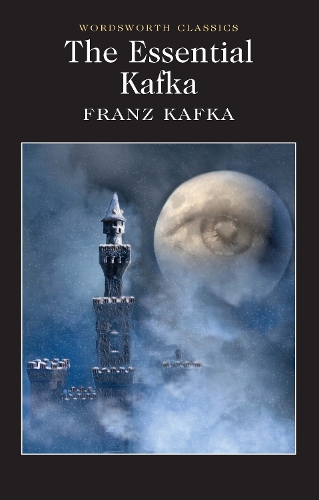
The Essential Kafka: The Castle; The Trial; Metamorphosis and Other Stories
(Paperback, UK ed.)
Publishing Details
The Essential Kafka: The Castle; The Trial; Metamorphosis and Other Stories
By (Author) Franz Kafka
Series edited by Dr Keith Carabine
Translated by John
Introduction by John
Wordsworth Editions Ltd
Wordsworth Editions Ltd
7th September 2014
14th September 2014
UK ed.
United Kingdom
Classifications
Physical Properties
Paperback
640
Width 129mm, Height 198mm, Spine 15mm
412g
Description
Like George Orwell, Franz Kafka has given his name to a world of nightmare, but in Kafka's world, it is never completely clear just what the nightmare is. 'The Trial', where the rules are hidden from even the highest officials, and if there is any help to be had, it will come from unexpected sources, is a chilling, blackly amusing tale that maintains, to the very end, a relentless atmosphere of disorientation. Superficially about bureaucracy, it is in the last resort a description of the absurdity of 'normal' human nature. Still more enigmatic is 'The Castle'. Is it an allegory of a quasi-feudal system giving way to a new freedom for the subject The search by a central European Jew for acceptance into a dominant culture A spiritual quest for grace or salvation An individual's struggle between his sense of independence and his need for approval Is it all of these things And K Is he opportunist, victim, or an outsider battling against elusive authority Finally, in his fables, Kafka deals in dark and quirkily humorous terms with the insoluble dilemmas of a world which offers no reassurance, and no reliable guidance to resolving our existential and emotional uncertainties and anxieties. AUTHOR: Franz Kafka (1883 - 1924) is a Jewish Czech who wrote in German, and who ranks among the twentieth-century's most acclaimed writers. His works evoke the bewildering oppressiveness of modern life, of anxiety and alienation in a world that is largely unfeeling and unfamiliar. Although most of his work was published posthumously, his body of work, including the novels 'The Trial' (1925) and 'The Castle' (1926) and the short stories including 'The Metamorphosis' (1915) and 'In the Penal Colony' (1914), is now considered among the most original in Western literature.
